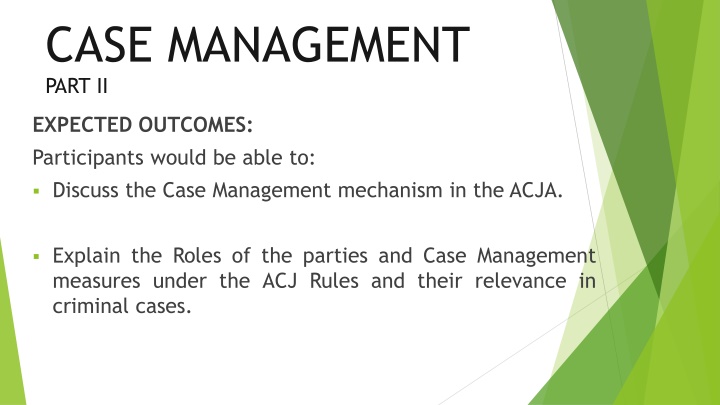
Case Management
Explore the Case Management mechanism under the ACJA, explaining the roles of parties, relevant measures, and provisions governing the efficient management of criminal cases. Discover how the ACJ Rules facilitate compliance and effective case handling to ensure speedy justice delivery and protection of rights.
Download Presentation

Please find below an Image/Link to download the presentation.
The content on the website is provided AS IS for your information and personal use only. It may not be sold, licensed, or shared on other websites without obtaining consent from the author. If you encounter any issues during the download, it is possible that the publisher has removed the file from their server.
You are allowed to download the files provided on this website for personal or commercial use, subject to the condition that they are used lawfully. All files are the property of their respective owners.
The content on the website is provided AS IS for your information and personal use only. It may not be sold, licensed, or shared on other websites without obtaining consent from the author.
E N D
Presentation Transcript
CASE MANAGEMENT PART II EXPECTED OUTCOMES: Participants would be able to: Discuss the Case Management mechanism in the ACJA. Explain the Roles of the parties and Case Management measures under the ACJ Rules and their relevance in criminal cases.
GENERAL CASE MANAGEMENT PROVISIONS: Section 36(4) of the Constitution of the Federal Republic of Nigeria, 1999 (as amended) provides that: Whenever a person is charged with a criminal offence, he shall unless the charge is withdrawn, be entitled to a fair hearing in public within a reasonable time by a court or tribunal
S. 294(1) of the CFRN, 1999 (as amended) states that Every court established by the constitution must: Deliver its judgment not later than ninety days after the conclusion of evidence and final addresses; Furnish all the parties all parties to the cause or matter determined with duly authenticated copies of the decision within 7 days of the delivery of judgment.
S. 1(1) of the ACJAstates that the purpose of the Act is to ensure: That the system of administration of criminal justice in Nigeria promotes efficient management of criminal justice institutions; Speedy dispensation of justice; Protection of the society from crime and protection of the rights and interests of the suspect, the defendant, and the victim.
CASE MANAGEMENT UNDER THE ACJ RULES, 2019 PURSUANT TO S. 259 CFRN, 490 ACJA, 2015 ORDER 8 ACJ RULES- CASE MANAGEMENT The purpose of the ACJ Rules is to ensure compliance with the ACJA and to realize the objectives expressed in s. 1(1) of ACJA.ORDER 1 RULE 1 ACJ RULES The ACJ Rules on case Management applies to cases in the High Court and Magistrate Court including an appeal to the High Court until the conclusion of the case. The court may give any direction to actively manage a case in order to prevent unnecessary delay.
CONTINUED By Order 8 Rule 3 ACJ Rules, the court may require a party to identify: Witnesses to give evidence in person. The order of witness evidence. The need for an order compelling attendance of witnesses. Arrangements that are desirable to facilitate the giving of evidence by a witness or the participation of any other person. The Registrar shall give a person entitled or required to attend a hearing a minimum of seven days or such time as reasonably practicable, and upon the courts directions, make the records available to the parties.- ORDER 8(4) ACJ Rules.
QUICK QUESTION: WHAT DOES DAY-TO-DAY TRIAL MEAN? This entails the conduct of a criminal case within the shortest possible interval and not necessarily the conduct of a case on daily basis S. 396(3) ACJA, 2015, 398(3) BENUE STATE ACJL
Continued Upon arraignment, trial shall be day-to-day until the conclusion of the trial. The court shall in consultation with counsel set a timeline for the trial up to adoption of final written address The timeline if possible shall include the names of witnesses and the days they are to testify. The court may apply the provision of wasted cost against a legal practitioner where counsel without reasonable cause fails to comply with the timeline
GENERAL POWERS OF THE COURT TO AWARD COSTS ORDER 10 ACJ Rules The Court has powers to award cost for the purpose of carrying into effect the provisions of the ACJA. This includes award of cost to ensure speedy trial of cases. The compensate the party for expenses incurred. cost should however be sufficiently reasonable to
POWER OF THE COURT TO AWARD WASTED COST Wasted cost is a cost awarded against a legal practitioner for a negligent act or omission which the court considers it unreasonable to impose on the party represented by the Legal Practitioner. ORDER 11 ACJ RULES This cost can be awarded against the legal practitioner where: Where the Counsel by his acts or omission is unable to proceed with his case. Where counsel by his act or omission has caused substantial and unjustifiable delays to trial.
Where counsel by his act or omission causes any other event that the court deems irrelevant and have caused substantial damage to the progress or outcome of the trial. Before making the order for cost, the court shall allow the counsel and any party to the proceedings to make representation and the cost shall take into consideration any previous order or cost. A counsel against whom such cost has been made may apply within 7 days from the date of the order or as may be extended by the court. The court may postpone the making of the wasted cost order until the conclusion of the case if it appears more appropriate to do so.
CAUSES OF DELAY IN CRIMINAL TRIALS Delay Caused by Legal Practitioners This problem is faced primarily when Legal Practitioners demand for several adjournments for trivial reasons. Some of these reasons vary from non- payment of legal fees to conflict in dates to even feigned ill health. The ACJA has addressed this problem with the introduction of day to day trial. S. 396(3) ACJA, s. 396 (3) NASARAWA STATE ACJL Where day- to- day trial is not practicable after arraignment, limit to number of adjournments 5 for each party from arraignment to final judgment. S. 396 (4) ACJA ,S. 396 (4)-(5) NASARAWA STATE. The ACJLKWARASTATE ACJLprovides for 7 adjournments.
Continued.. Where it is impracticable to conclude a criminal trial after the parties have exhausted their five adjournments each, the interval between one adjournment to another shall not exceed seven days inclusive of weekends. The court may award reasonable cost to discourage frivolous adjournments and also carter expenses incurred by witnesses. S. 252 ACJA
The role of the lawyers in the use of interlocutory application in the course of trial causes delay. In FRN v Borishade(2015) All FWLR (785) 227 SC, the higher Court lamented when the proceedings at the trial Court was stalled for 7 years to await the outcome of an appeal against its ruling. It is commendable that the ACJA prohibits entertaining of an stay for proceedings in criminal cases. S. 306ACJA, 304 KOGI STATEACJL.
Delay Caused by the Courts The frequent transfer of Judges has been a serious issue as it usually results to the trials staring de novo. The practice of some Judges not delivering spot on rulings has also been an issue as dates are taken to deliver rulings on very harmless applications and objections also causes delay in speedy administration of justice.
Delay Caused by the Prosecutor Prosecutors sometimes cause delay in speedy dispensation of justice. This can be seen in excuses ranging from incomplete investigation, loss of case file to inability to secure the presence of witnesses to testify.
Systemic Delay The entails delay arising from inadequate courtrooms, infrastructural facilities and poor working conditions of the judiciary. A lot of facilities that would have facilitated speedy trial are largely lacking. Industrial actions. E.g strike by JUSUN Destruction of courts during violent protests
IMPORTANCE OF CASE MANAGEMENT It helps to avoid delay of criminal trials. It helps to enhance efficiency and effectiveness in the justice system. It helps to ensure that justice is not denied. It helps to achieve victim satisfaction. It helps to improve confidence in the judiciary.
The ROLE OF DIFFERENT ACTORS IN CASE MANAGMEMENT THE ROLE OF THE COURT The Judge The Judge should be hardworking and diligent in the discharge of his duties. The phrase, Court sits at 9am should be strictly followed. AJudge should also instill discipline and hard work in staff in his Court. Discretion in granting adjournment should be exercised judiciously and judicially. The provisions of theACJA should serve as a guide.
The Judge should take advantage of the time saving mechanism and provisions provided for in the Administration of criminal justice Act in criminal cases. The Judge should be abreast with the law. The judge should also keep himself up to date with current technology.
Court Registrar. Maintain an up to date diary of the cases in the Court. Ensure that matters coming up for judgments and rulings are promptly brought to his attention. Ensure that notices required to be served under the ACJA by the Registrar are promptly done.
.. The Registrar should endeavor to monitor the inflow of cases and place mechanism for monitoring cases. Cases which have stayed too long should be given attention and priority. The Registrar should ensure that cases are not forgotten at the Registry for any reason. The Registrar can also ensure that the registry is well organized. An effective filing system that makes case retrieval easier should be developed. Ensure that both chambers and registry are well organized.
THE ROLE OF LEGAL PRACTITIONERS Legal practitioners should: Avoid asking for unnecessary adjournments and be well prepared for trial. Comply with case timelines agreed upon. Educate witnesses on the provisions of ACJA and ACJLs relating to witness protection. Educate witness on the provisions on failure to appear to give evidence. The ACJA(ss. 251-254) makes provision for witness expenses to be paid when necessary. Sections 246 to 250 ACJA (same provision in s. 248 ACJL, Benue State) regulating the conduct of witness is also targeted at speedy trials.
The Role of the Prosecutor The Prosecutor must: Ensure to keep track of all cases handled by him. Ensure that adequate provision is made for expenses of witnesses. Ensure that witness protection is utilized when necessary. Avoid unnecessary adjournments. Be abreast with the case file.
The Role of the Complainant The Complainant should: Ensure that the keep track of his case. Ensure to keep in touch with the witnesses. Punctual to Court especially when his physical presence is required
LESSONS FROM OTHER JURISDICTION United States of America The Sixth Amendment to the US Constitution gives the defendant right to a speedy trial. The Speedy Trial Act(2019 US Code Title 18, Part II, Chapter 208) and some state laws provide some guidance on when the right to speedy trial may be violated. Some state laws provide the time within which a defendant shall be brought before the court except there is reasonable cause for the delay. A violation of the speedy trial rule means that any conviction and sentence must be wiped out and the case dismissed if it has not reached trial. Time for determining speedy trial begins to run from the day of arrest.
The information or indictment must be filed within 30 days from the date of arrest or service of summons. However, to ensure that the defendants are not rushed into criminal trial, it Act provides that trial may not begin less than 30 days from the date the defendant first appears in court, unless the defendant agrees in writing to an earlier date. See UNITED STATES V ROJAS-CONTRERAS, 474 US.231(1985) where the court stated that this period does not begin to count afresh by filing a similar superseding indictment. Trial must commence within 70 days from the date the information was filed or from the first date the defendant first appeared before the court. The court can dismiss a charge where it is not brought within the time prescribed by the law. Even when brought within the time prescribed, it may be dismissed if the defendant can show that the delay was intentional by the government do get undue advantage. STATES V LOVASCO, 431 US 783 (1997)
South Africa Section 35(d) of the Bill of Rights provides that every person has the right to a fair trial, which includes the right to their trial begin and concluded without unreasonable delay have
CONCLUSION Legal practitioners must at all times ensure that the mechanisms provided for speedy trials under the ACJA and ACJLs are utilized and whenever practicable, draw the attention of the various actors to the provisions applicable by them. This will go a long way in ensuring that the quest for the attainment of speedy dispensation of criminal trials which is at the forefront of modern criminal legislations is achieved.
REVIEW QUESTIONS: Outlines three instances where wasted cost can be awarded against a legal practitioner under the ACJ Rules. Outline 5 importance of Case Management in criminal justice administration.
THANK YOU ALL THE END






















